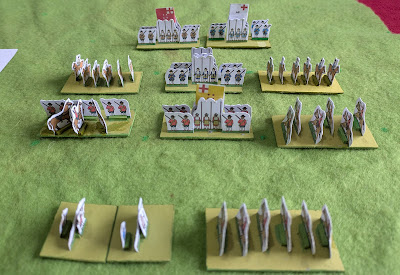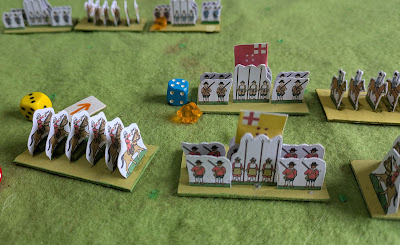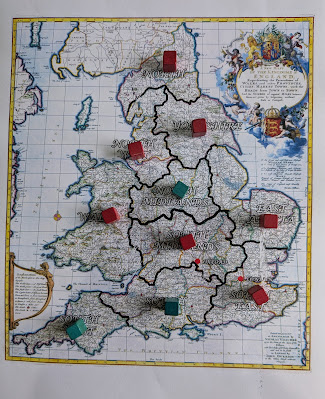1646 began with the situation still very much in Parliament's favour. 1645 had seen the Royalists try two offensives, both of which had been easily blocked. With the country tired of war the Royalists would need to perform miracles to see things swing their way.
Early in the year Parliament decided to take advantage of the Royalist weakness, and advanced into Yorkshire with a large army. In response the Royalists assembled all of the troops they could and moved to counter them. They brought the Parliamentarians to battle at Otley in West Yorkshire. Their army was led by the King himself, who was facing Sir Thomas Barnaby.
Game 9 - The Battle of Otley
Royalists - 1 x Elite Horse, 1 x Horse, 1 x Melee Foot, 1 x Elite missile Foot, 1 x Missile Foot
Parliament - 2 x Horse, 2 x Missile Foot, 1 x Dragoons, 1 x Artillery
The Royalists formed up with Rupert's elite horse on their right. Parliament opposed them with a mix of horse and dragoons.
An initial artillery bombardment did nothing but waste daylight.
Turn 1 - Parliament opened the battle by advancing on Rupert's horse. A series of inconclusive engagements took place.
Goaded by the Parliamentarian probe, Rupert ordered a charge. But Barnaby's troops made the most of the ground they were on and the Royalist horse was routed.
Turn 2 - With his left flank now threatening the Royalist foot, Sir Thomas ordered an advance in the centre. The Royalists fell back in disarray, obviously discomfited by the swift loss of their horse. The King advanced his best foot to hold the line.
The Royalists attempted to stabilise their right, but their foot became caught up in a stalemate with the Parliamentarian dragoons who continued to exploit their terrain advantage.
Turn 3 - With the Royalist right in complete disarray Parliament sent in their reserve horse. This smashed the Royalist centre and the King's army routed.
Charles escaped the battlefield, but had no significant forces left in the area. He fled to Scarborough where he took a ship to France and exile.
With the loss of Yorkshire the Royalist cause was defeated. They still had some support in the south and south-west of England, as well as a pocket in the Midlands, but their armies were exhausted and demoralised after two years of defeats.
Indeed the whole country was exhausted. To some extent the Royalists had lost the war in 1643 when Oxford fell, but whilst Parliament had enjoyed a lot of support their failure to completely extirpate the Royalist cause caused the war to drag on for years longer than it should have done.
Despite the lack of change for most of the campaign it still gave some fun battles, and I hope you've enjoyed following it. If I did it again I'd probably make one cosmetic change, and have three battles each in 1643 and 1644, then two in 1645. There would still be ten battles, so mechanically the campaign would be the same. But it would create a better feel I think.









A fine, well narrated campaign! I rather think, you know, that the war was lost the moment London came in on the side of Parliament, that is to say, the moment Charles quitted the place to rally support in Nottingham. Even had a post-Edgehill push managed to seize London, the Royalist hold would have been tenuous at best, and fairly transitory. Still, there are always 'what ifs'!
ReplyDeleteCheers,
Ion
Bravo! That was a very enjoyable campaign.
ReplyDeleteLoved it. Nicely done.
ReplyDeleteGreat campaign! Fun and still somewhat up in the air until the end. Perhaps the stage is set for a return of the king a few years down the road, maybe with French backing...
ReplyDeleteThis Campaign worked very well indeed - nice work on the visuals too. Lovely map.
ReplyDeleteCongrats on a great campaign, well presented and actually concluded (a ‘big win’ compared to so many unfinished wargames campaigns!). Very enjoyable to follow. 👍🏼
ReplyDelete